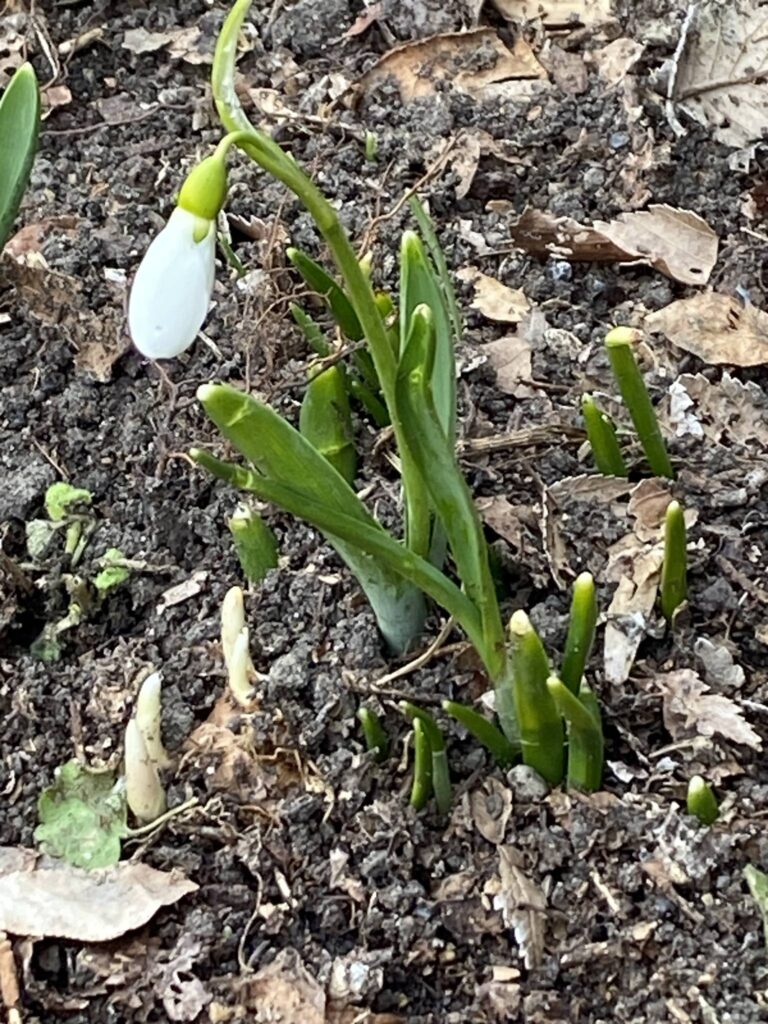Garden log 2/7/24. A few days ago, I started raking up the garden. It felt weird to do so this early — a solid month or so before I normally do. And we MIGHT get another hard frost, in which case I’ll be running out to put some leaves back on the most tender flowers to protect them. But that’s not looking likely right now, and if we get a little snow, all of my early spring ephemerals and perennials will be fine with it.
You might be choosing to ‘leave the leaves,’ which I’m heartily in support of — it’s better for pollinators, who are nestling in the leaves and inside twigs, and not quite awake yet. I don’t rake back the leaves because I want it neater (which is why I don’t call it ‘spring clean-up’) — my garden leans strongly wild in flavor anyway.
But I have heavy leaf cover, and have planted lots of tiny snowdrops and such, that can’t push their way through it. (Daffodils and tulips will be fine, if you don’t plant the very early spring bulbs.)
My compromise is to plant those early spring bulbs in particular areas, mostly along the paths, under the redbud, or in the small patch of grass. So I can rake those areas up, and leave the rest for another month or two. I don’t compost the leaf piles right away — I leave them in a corner of the garden, given any little bugs that have survived my raking a chance to sleep a little longer and wake up when they’re ready.
My block is mostly condos and apartments that have very little in the way of flowers and lots of blown-clear grass. I’d love to see more of Oak Park with dried leaf cover and little leaf piles around in spring.
And when the pollinators are out (maybe as early as March this year? Hard to tell), I’m planning to dig out the leaf shredder and shred the piles, making finer piles which I can then spread on the flower beds (it’s great for improving our heavy clay soil!), with a layer of triple-milled hardwood mulch on top (which also breaks down, a little more slowly). I’ll likely do that around the time I start watering, since mulching helps cut down on the need to water (good for my laziness, good for the planet). Usually around May, I think, though this year, who knows…?
I’m trying to spend 15-30 minutes working in the garden most days, now that it’s warming up; it’s so much better for my physical and mental health. The days it feels too cold, I’ll be working on seed starting! Gardening every day makes me happier. I say hello to the plants I recognize, and try to remember the ones I don’t — those sprouting in the fifth picture, I can’t remember what I planted there… oh well. It’ll become clear eventually. As
I get older (I’m 52), I gain lots of gardening knowledge each year, but also forget a lot. It’s a race. 🙂
This morning I raked another little area of snowdrops clear, cut the old, scraggly leaves off the hellebores (first perennial to bloom), and started cutting off the dried hydrangea flower heads. I’ll leave Annabelle a little longer, because it still looks interesting and reasonably symmetrical, but my others were looking more sketchy.
I also spent at least half the time trying to cut down all the hackberry saplings that I’d missed in the fall. They are insidious, and I had a bad gardening year last year, with a sprained ankle followed by too much work travel, including some international, in March and April , and they got totally out-of-control for the first year since we moved in, in 2009.
So this year is going to be an intense hackberry battle — I don’t use herbicides in my yard, so it’s a) pulling up the tiny ones, b) digging up the slightly bigger ones, and c) cutting to the ground the ones that have gotten too big for me to easily dig. If I just stay on top of it and keep cutting those down, I think eventually they’ll wither for lack of light — it worked when we were fighting a tree-of-heaven infestation when we first moved in. Fingers crossed.
(No pics of hackberry saplings, sorry. If you have them, you probably know!)
Gardening season, a month early. Worrying for the planet, but for my own little garden, all I can do is try to adapt. The flowers come when they come, and we are grateful for them.








